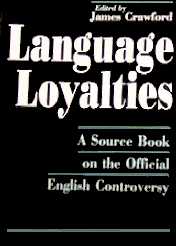|
Language Loyalties
 INTRODUCTION
TO PART II INTRODUCTION
TO PART II
The Debate over
Official English
By James Crawford
What is at issue in the Official English debate? A consensus
has been elusive, because to define the terms of the argument is to gain
a decisive advantage. While supporters and opponents frame the controversy
in various ways, they tend toward two distinct outlooks.
Viewed in one way, this is a discussion about national
identity: what it means to be an American in the late twentieth century
and what will hold Americans together during a time of bewildering change.
It is about how much diversity a nation can tolerate, even a nation of
immigrants. Should cultural pluralism extend to language if that means
Americans will be less able to communicate with each other? Are we ready
to discard the ideal of a common language, which has kept the melting pot
simmering for so long? Can't we respect ethnic traditions without accepting
a "salad bowl" mentality that emphasizes what divides rather
than what unites us as a people? If government allows immigrants to cast
ballots and go to school in their native tongues, won't this reduce their
incentives to learn English? By legitimizing bilingualism, are we not we
asking for a future of linguistic strife and perhaps separatism à
la Québec?
Viewed from another perspective, this is a conflict over
rights: equal access to education and government – for immigrants and other
Americans who face language barriers – and freedom of speech in the language
of one's choice. It is also a clash of attitudes: nativist bias versus
tolerance toward newcomers, Anglo-conformity versus an appreciation of
diversity. Should we bow to ethnic fears and resentments, imposing a cultural
tyranny of the majority? Can we allow language to be used as a weapon of
race prejudice, an instrument to discriminate against unpopular minorities?
Shall we deny citizens the right to vote or children the opportunity to
learn, canceling bilingual programs because some zealots perceive a symbolic
threat to English? Can we live with an English Only amendment that usurps
local discretion to offer needed services in other tongues? Are Americans
willing to submit to government language restrictions, perhaps enforced
by language police à la Québec?
Both positions are plausible and internally consistent.
The question is, what relation do they bear to the material world? A number
of claims cry out for factual documentation, for example:
- the "erosion of English" in the United States;
- draconian effects of the English Language Amendment;
- linguistic uniformity or democratic principles as the
key unifier of Americans;
- separatist inclinations among language minorities;
- immigrant resistance to learning English;
- the anti-immigrant agenda of English Only proponents;
- analogies to language conflicts elsewhere.
The commentaries that follow include speeches by Congressional
sponsors and opponents of Official English, newspaper columns and editorials,
miscellaneous articles, and organizational statements, pro and con. In
addition, there are documents relevant in assessing these opinions: versions
of the English Language Amendment, state Official English laws, and legislative
alternatives, including resolutions endorsing "English Plus"
and Native American language rights. To put these writings in perspective,
this section begins with a chronology detailing the progress of the English
Only movement and related skirmishes over language issues.
A further complication in the debate over Official English
is the fact that many Americans have trouble taking it seriously. It has
inspired not only rancor, but a good deal of frivolity – perhaps for similar
reasons. Language is inescapable, bound up not only with our politics,
but with our most personal experience. It conveys status, intellect, group
loyalties, and a myriad of impressions about our fellow humans, justified
and otherwise. Though it is a social institution, language defies social
control, capriciously changing at the whim of individuals. It evokes anger,
pride, humor, and ridicule, in varying proportions. Some Americans become
incensed over the latest neologism, while others are fascinated with dialect
differences or amused by language snobbery.
Often, when introduced in state legislatures, Official
English has meant a break from the dreary routine of public business –
not an insignificant factor in its success. Mississippi declared English
official following "debate" over various tongue-in-cheek amendments.
One would have required legislators to pass a remedial English course before
the law could take effect. Another declared: "The following words
and terms will no longer be recognized in this state, since said terms
are either incomprehensible or are not of pure English extraction: Y'all;
hominy; canoe; up-air; down-nair; and yonder."
On encountering an amendment to recognize "Southern English,"
the sponsor of Tennessee's Official English legislation cut short the clowning,
explaining that bilingualism was "no laughing matter." Whereupon
his chastened colleagues passed the bill with a single dissenting vote.
COPYRIGHT NOTICE: From LANGUAGE LOYALTIES:
A SOURCE BOOK ON THE OFFICIAL ENGLISH CONTROVERSY, by James Crawford, published
by the University of Chicago Press. Copyright © 1992 by the University
of Chicago. All rights reserved. This text may be used and shared in accordance
with the fair-use provisions of U.S. copyright law, and it may be archived
and redistributed in electronic form, provided that this entire notice,
including copyright information, is carried and provided that the University
of Chicago Press is notified and no fee is charged for access. Archiving,
redistribution, or republication of this text on other terms, in any medium,
requires the consent of both the author and the University of Chicago Press.

|